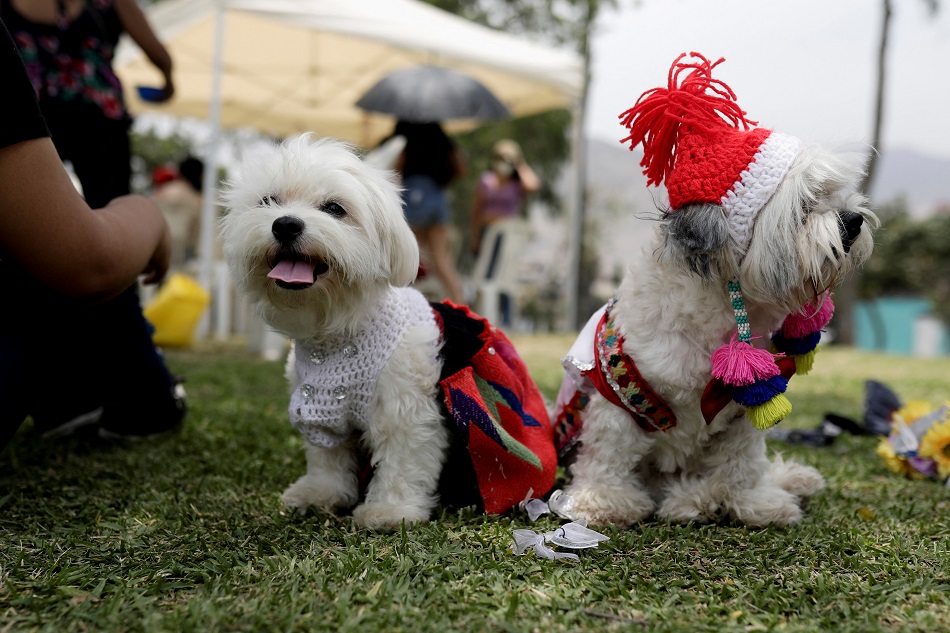Dogs show signs of mourning after loss of canine companions, says study | ABS-CBN
ADVERTISEMENT

Welcome, Kapamilya! We use cookies to improve your browsing experience. Continuing to use this site means you agree to our use of cookies. Tell me more!
Dogs show signs of mourning after loss of canine companions, says study
Dogs show signs of mourning after loss of canine companions, says study
Agence France-Presse
Published Feb 25, 2022 04:45 AM PHT
Dogs are deeply affected by the deaths of canine companions, eating and playing less and seeking attention more following a loss, a large scientific study said Thursday.
Dogs are deeply affected by the deaths of canine companions, eating and playing less and seeking attention more following a loss, a large scientific study said Thursday.
Signs of grief have previously been reported across many species, including great apes, whales, dolphins, elephants and birds.
Signs of grief have previously been reported across many species, including great apes, whales, dolphins, elephants and birds.
Among the canid family, there were some prior indications: some wild wolves have been reported burying the carcasses of 2-week-old pups, and a dingo mother had been observed transporting its deceased pup to different locations in the days following its death.
Among the canid family, there were some prior indications: some wild wolves have been reported burying the carcasses of 2-week-old pups, and a dingo mother had been observed transporting its deceased pup to different locations in the days following its death.
But the evidence was overall sparse, and, when it came to domestic dogs, confined to anecdotal reports from owners, which run the risk of anthropomorphism and over-stating the case.
But the evidence was overall sparse, and, when it came to domestic dogs, confined to anecdotal reports from owners, which run the risk of anthropomorphism and over-stating the case.
ADVERTISEMENT
The new study, published in the Nature journal Scientific Reports, involved a survey completed by 426 Italian adults who owned at least two dogs, one of whom had died while the other was alive.
The new study, published in the Nature journal Scientific Reports, involved a survey completed by 426 Italian adults who owned at least two dogs, one of whom had died while the other was alive.
Negative changes were reported by 86 percent of owners, with a quarter saying these lasted longer than 6 months.
Negative changes were reported by 86 percent of owners, with a quarter saying these lasted longer than 6 months.
These behaviors included more attention seeking (67 percent), reduced playfulness (57 percent), and reduced overall activity (46 percent).
These behaviors included more attention seeking (67 percent), reduced playfulness (57 percent), and reduced overall activity (46 percent).
Surviving dogs also slept more, became more fearful, ate less, and whined or barked more.
Surviving dogs also slept more, became more fearful, ate less, and whined or barked more.
The researchers found that the length of time the two dogs had lived together was not an important factor in determining grief — rather it was the quality of the relationship the pair had shared that mattered.
The researchers found that the length of time the two dogs had lived together was not an important factor in determining grief — rather it was the quality of the relationship the pair had shared that mattered.
How much the owner felt the loss also played a significant role, suggesting that the surviving dog was also responding to the human's emotional cues.
How much the owner felt the loss also played a significant role, suggesting that the surviving dog was also responding to the human's emotional cues.
"This is potentially a major welfare issue that has been overlooked," with better understanding of behavior patterns key to meeting the animals' emotional needs, concluded the authors.
"This is potentially a major welfare issue that has been overlooked," with better understanding of behavior patterns key to meeting the animals' emotional needs, concluded the authors.
RELATED VIDEO
ADVERTISEMENT
ADVERTISEMENT



